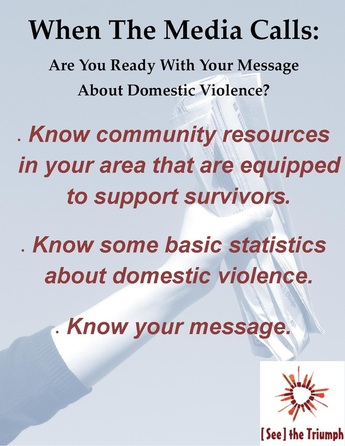|
By Christine Murray, See the Triumph Co-Founder
Imagine this: You just got home from a long day at work, your children are tired but wound up after a full day at school, and it’s been raining all day, so your hair is looking just as frazzled as you feel. Your main goals are to get dinner on the table for the family and then try to enjoy a restful evening at home so you’ll be ready to take on an equally busy day tomorrow. But then, seemingly out of the blue, you get a call from a local television station inviting you to do an interview that evening--within the hour, in fact--for a story they’re doing on domestic violence, which they’re planning to run later that night in the 11 o’clock news. This exact scenario played out for me a couple years ago, as the local TV station knew of my work related to domestic violence and was seeking someone to provide information about the dynamics of domestic violence to include in the story. There had been a horrific domestic violence homicide in my community, and as the story was hitting the news, the TV station wanted to include information to help its viewers understand the dynamics of domestic violence, as well as resources in the community to help. My initial response? I wanted to say, “No!” I explained that I had my two young children at home with me so wouldn’t be able to meet them for an interview, to which the reporter responded that he could come to meet me in my home. Then, I asked if they had contacted other professionals who work to address domestic violence in our community, including local law enforcement officers and the local domestic violence agency. His response? Something like, “We’ve tried to contact everyone, and you’re the only person we’ve been able to get in touch with.” My last-ditch effort was to ask if they could meet me in my office the next day, when I’d have more time to prepare for the interview. To this, he said that the story would be running that night, and it was absolutely essential that they do the interview that evening. Despite all the reasons this interview was not good timing, I knew I had no choice but to say yes --it was an all-too-important opportunity to educate the community about domestic violence. And, the information he was asking about was especially important at that moment because I knew it’s possible that, when people hear stories about other people experiencing domestic violence in the news (and especially about a homicide), it can prompt them to seek help or reach out to someone in their life who’s in an abusive relationship. And so, I said yes. And I did the interview...It wasn’t my best interview, and I wasn’t completely happy with how it turned out at the time, but it got the job done and shared the information that they wanted to include. What I learned from this experience was how important it is for those of us who work to raise awareness about domestic violence to be ready for whenever the opportunity arises to share messages that educate others about the dynamics of abusive relationships. This sort of information is essential for communities working to prevent further abuse, support survivors, and hold offenders accountable. Sometimes, media coverage about domestic violence is planned long in advance, such as if a magazine is planning an in-depth story about the issue. But, in my experience, most media coverage about domestic violence springs up without much notice, often in response to a major case--such as a homicide--hitting the local news or a high-profile case involving a celebrity or professional athlete. For a recent example of this, we need look no further than the flurry of media coverage of domestic violence after the Ray Rice videos surfaced. And so, we need to be ready to answer the call when the moment arises. Here are three pieces of information I suggest you prepare now so that you’d be ready at moment’s notice if an interview opportunity arises:
By educating our communities about domestic violence through the media, we can reach new audiences and create greater support in our communities for survivors.
0 Comments
Leave a Reply. |
Archives
July 2024
CategoriesAll About Intimate Partner Violence About Intimate Partner Violence Advocacy Ambassadors Children Churches College Campuses Cultural Issues Domestic Violence Awareness Month Financial Recovery How To Help A Friend Human Rights Human-rights Immigrants International Media Overcoming Past Abuse Overcoming-past-abuse Parenting Prevention Resources For Survivors Safe Relationships Following Abuse Schools Selfcare Self-care Sexual Assault Sexuality Social Justice Social-justice Stigma Supporting Survivors Survivor Quotes Survivor-quotes Survivor Stories Teen Dating Violence Trafficking Transformative-approaches |
Search by typing & pressing enter



 RSS Feed
RSS Feed